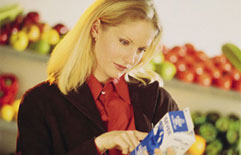Russian organic products mere myth
 Results of the CVS Consulting research reveal that about half of Russia's major producers mark their products as “organic” and “environmentally pure” having no certifications or ecological expertise.
Results of the CVS Consulting research reveal that about half of Russia's major producers mark their products as “organic” and “environmentally pure” having no certifications or ecological expertise.

This allows such companies to raise prices by 20-30 per cent. These companies go unpunished because Russian legislation provides for no restrictions for usage of the marking; regulations on ecological products certification are to be adopted at the end of 2005.
Conflicts about baby food components entailed legal procedures.
Participants of an international conference “Prospects of the Russian eco products market under expansion of modern technologies” held in Moscow arrived at a conclusion that there are no organic foods in Russia today.
President of the Consumer Societies Confederation Dmitry Yanin explains that ecological products everywhere in the world are those produced in clean regions without chemicals, fertilizers and genetic modifications. However, the notion of “organic” products is not yet fixed in the Russian legislation or certification principles.
At the same time, the CVS Consulting research conducted in August reveals, clients of Moscow stores will pay more when they see products marked as ecologically pure. Russian producers are perfectly aware of the tendency: 48 per cent of producers admit they mark products as “organic”, “ecologically pure” or “natural product” without any specific expertise at all. Correspondingly, the price in this case goes 20-30 per cent up. So, Dmitry Yanin thinks while Russian consumers led by advertising think they pay for safety they in fact pay for nothing. Unfortunately, there are no governmental standards or technical regulations on usage of this marking, that is why careless producers use the marking incorrectly and go unpunished.
Producers in their turn insist that they mark products as “ecologically pure” because they control the quality of their products. Director General of Ledovo (the company grows champignons and breeds shrimps) Nadezhda Bolotova says the Russian Academy of Sciences Nutrition Institute controlled products of the company. Indeed, the statement perfectly agrees with the company’s marketing strategy. But in fact it is quite a problem to control the ecological condition of the sea where the company's shrimp is fished out. The director was also rather embarrassed when asked about the origin of the shrimp packing.
Today, Germany, Great Britain, France, the USA, Canada and Japan are the markets of organic products. Leading expert with the Institute of the Agrarian Market Conjuncture Tatyana Rybalova says the total volume of the world market of ecological food made up about $28 billion in 2003 (1-3 per cent of the world volume of food sales). The price of ecological food abroad is 1.5-3 times higher than of ordinary food. Producers of ecological food are to observe strict regulations.
Territories meant for future growing of ecologically pure products undergo cleansing procedures within three years in order producers could get ecological certificates. No chemicals or fertilizers are allowed for production of such food. Hand work is often recommended for such production. A product must contain 95 per cent of organic components to be marked as organic or ecologically pure.
All attempts to import ecologically clean products to Russia failed. Majority of Russian consumers could not afford such products as the prices were 6-8 times higher than prices for ordinary food.
The whole system of the Russian agriculture must be modified to start production of ecologically pure products in this country. Tatyana Rybalova says no modifications are to happen in Russia in the nearest time, which means there will be no ecologically pure products as well. Some small farms that are ready to produce organic food are so much insignificant for the big country.
President of the Russian Grain Union Arkady Zlochevsky says people tell lies when say they use no fertilizers on farm fields. “They would not give fertilizers up,” he says.
Producers are reluctant to change the situation as there is no stimulating legislation on production of ecologically pure products in Russia. Director of the Agrosofia research enterprise for development of ecological and biodynamic agriculture Andrey Khodus says technical regulations on control of production have been developed and submitted for public consideration. Experience of international organizations involved in production and expertise of ecologically pure products was used for development of the document. Andrey Khodus thinks the entire cycle of food production requires certification like in Europe. The discussion of the regulations is to be finished in July 2005; the regulations may be adopted at the end of 2005.
Subscribe to Pravda.Ru Telegram channel, Facebook, RSS!


